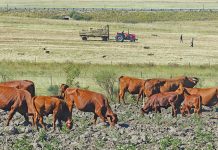The absence of black commercial farmers is a major limitation to food security in sub-Saharan Africa, and there is an urgent need for role-models to instill enthusiasm in the younger farming generation.
This was the key message from Dr Neil Miles, deputy manager of the KwaZulu- Natal of Agriculture and Environmental Affairs, at the Fertiliser Society of South Africa’s technical symposium held in Pretoria recently. e said while efforts to ensure food security for the rural poor need to continue, successful commercial farming operations in sub-Saharan Africa are vital for food security. “There’s overwhelming evidence that sub-is grossly food-insecure and, barring major interventions, the position appears likely to worsen in years to come,” he said, adding that more commercial farmers are needed to feed Africa’s growing urban populations.
The UN’s Development Programme figures predict that by 2025 the majority of the poor in Africa will be living in urban as opposed to rural areas. I n addition to establishing more commercial farmers, Dr Miles said the region must also increase its use of fertilisers to improve food quality, crop yields and soil health. “
Fertiliser may not be the silver bullet for Africa, but there is no silver bullet that does not include fertiliser,” he said. African farmers currently use far less fertiliser than their counterparts in other regions of the world, with a recent study showing that fertiliser use per unit cropped area is less than a tenth of the world average.
Dr Miles expressed concerns about the perception that fertilisers are harmful to soils and have a negative effect on crop and food quality. He said when used correctly, fertilisers improve food quality, crop yields and soil health, and are an indispensable tool for sub-Saharan Africa to achieve food security and realise its agricultural potential. “With more than 200 million people in sub-Saharan Africa starving, policy-makers need to be aware of the facts,” he said. – Wilma den Hartigh








